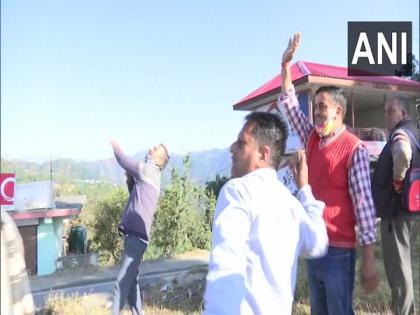Centuries-old tradition of stone-pelting in Himachal's Dhami village a low-key affair due to COVID-19 pandemic
By ANI | Published: November 6, 2021 12:22 PM2021-11-06T12:22:41+5:302021-11-06T12:30:02+5:30
The centuries-old tradition of stone-pelting, performed to appease Goddess Kali in Dhami village of Himachal Pradesh was a low-key affair this time owing to the COVID-19 pandemic and compliance to necessary guidelines to prevent its spread of the viral disease.

Centuries-old tradition of stone-pelting in Himachal's Dhami village a low-key affair due to COVID-19 pandemic
The centuries-old tradition of stone-pelting, performed to appease Goddess Kali in Dhami village of Himachal Pradesh was a low-key affair this time owing to the COVID-19 pandemic and compliance to necessary guidelines to prevent its spread of the viral disease.
Jagdeep Singh, the organiser of the programme and a member of the royal family toldthat according to tradition, when a participant gets hit with a stone and gets injured, their blood is offered to Goddess Kali.
"This tradition is centuries-old. It has been going on since the time of human sacrifices. But one of our queens did not like the idea of human sacrifices. She gathered some clans like Jathoti, Tunru, Daghoi and Karedu on one side, and there is the Jamogi clan and all the other clans on the other side. It was decided that a game of stone-pelting will be played among these two sides. If a participant gets hit with the stone and gets injured, his blood is offered to Goddess Kali," said Singh.
He said that this time around, a small function was organised to keep the tradition alive while following the government's guidelines to prevent COVID-19 spread.
"I offered by blood to the goddess this time," he added.
Ranjeet Singh Kanwar, the secretary of the organising committee informed that the tradition is around 400-500 years old.
"It celebrated every year on the next day after Diwali. I have been involved in the organisation of this event for 40-45 years. Blood is offered at the sight where the queen offered her sacrifice. To keep the tradition alive, a small, restricted ceremony was organised this time," said Kanwar.
Local youth are however disappointed with the low-key celebrations this time and want to preserve this age-old tradition.
A local youth named Gitesh told ANI, "Since last 2 years, it is not being organised on a bigger scale. On one side, it is fair since large gatherings can lead to Covid spread, but on the other side, other festivals like Dusshera and political rallies are being conducted in full swing."
"It would have been better if we were given a specific time and venue to go ahead with the tradition. We would like to preserve this tradition since it is going on for a long time," he added.
( With inputs from ANI )
Disclaimer: This post has been auto-published from an agency feed without any modifications to the text and has not been reviewed by an editor
Open in app